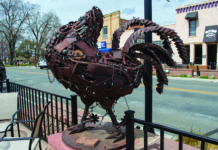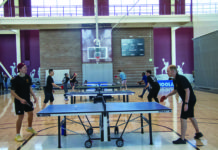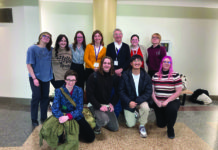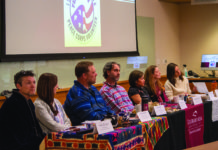“I want to thank you and all your microorganisms for being here today.” Dr. Jessica R. Houf said. Dr. Houf, of the University of Utah, paced the room, ready to share her research on communication as part of a public reading at Colorado Mesa University.
On Tuesday, Feb. 19, she’s presented on two separate processes: how humans communicate about bacteria within the field of medicine and how bacteria themselves communicate within the human body. “I am fascinated by bacteria,” Houf said. “I have microscopes in my basement. I swab my dog’s mouth just to see what’s in there.”
The public reading was part of an ongoing series that CMU has been putting on for a while. Speakers share their creative writing or scholarship research. Writers read from their poetry and stories and talk about the creative process, source of their work and struggles they encountered. Scholars discuss their research projects, and like the creative writers, talk about process.
Dr. Houf’s presentation is structured around three main points: introducing the human micro-biome, talking about post-human rhetorical history, and discussing antibiotic resistance. In particular, the bacteria C. difficile, and how it can affect people. “Who we are is affected by our microbiomes,” Houf said. A human microbiome is an ecological community of microorganisms that share our bodies with us, and can help us deal with disease and foreign bacteria.

The post-human rhetorical history focuses on human exceptionalism and communication, especially what Houf describes as combinatorial communication. “Combinatorial communication means that the two signals combined create a different meaning than the two signals do alone. If we think about monkeys, they might have a call to warn all the other monkeys that a leopard is present, and another call if there’s an eagle present. But the meaning changes when the two signals are mixed,” Houf said.
Houf’s research and speaking regarding human exceptionalism boiled down to humans thinking they’re unique for communication, especially the combinatorial kind, whereas in reality that sort of communication is present everywhere, including the bacteria inside of us.
“Our larger goal is to give our students an opportunity to learn from regional writers and scholars. Listening to others widens our perspective, and the events may even provide networking possibilities. Our guests benefit faculty as well. We learn along with the students, and it opens the door for collaboration. Finally, Grand Junction can often feel remote, and inviting others enlarges our world,” Dr. Barry Laga, the Department Head of Languages, Literature, and Mass Communication, said about the speaking events,
Widen our perspective indeed. Dr. Houf talked about fecal transplants and how C. difficile can be responsible for these kinds of problems, and suddenly not everything seems so farfetched anymore. With all the talk about micro-biomes and rhetorical history, throwing in something as out of left field as fecal transplants lends itself well to making us think, whether it be about communication, human exceptionalism, or the occasional number two joke.






